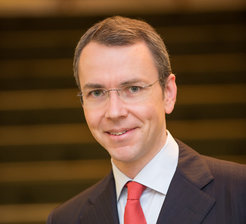Professor Immanuel Bloch receives Senior BEC Award 2013
Prof. Bloch will receive this prize for “his pioneering experimental contributions to the field of quantum many-body physics with cold atoms in optical lattices”.

The Scientific and Award Committees of the Bose–Einstein Conference Series honours Prof. Immanuel Bloch, Director at the Max-Planck-Institute of Quantum Optics and Professor for Experimental Physics at the Ludwig-Maximilians-Universität Munich, with the Senior BEC Award 2013. Prof. Bloch will receive this prize for “his pioneering experimental contributions to the field of quantum many-body physics with cold atoms in optical lattices”. Since the discovery of Bose-Einstein condensates – a very special, exotic form of matter – in 1995, BEC Conferences take place biannually at different locations. “BEC conferences are the highlight of the meetings concerning the physics of ultracold atoms, as almost all top groups carrying out research in this field are participating,” Prof. Bloch says. The International Senior & Junior BEC awards have been established two years ago. This year’s winner of the Junior BEC Award is Prof. Markus Greiner (Harvard University), who was affiliated with the MPQ in the early years of his career.
The existence of a so-called Bose-Einstein condensate has been predicted by Albert Einstein and Satyendra Nath Bose about 90 years ago, describing the statistics of a gas of identical quantum particles that are characterized by their integer spin. Below an extremely low critical temperature these particles go all at once into the lowest possible quantum state, forming a “condensate” in which the waves of the individual particles merge into one single matter wave of almost macroscopic dimensions – about 100 micrometres. BECs have been brought into reality in 1995 for the first time, almost parallel by two different research groups in the USA – a discovery, for which Eric Cornell, Wolfgang Ketterle and Carl Wiemann were given the Nobel prize in Physics in 2001.
“Today, BECs serve as a starting point for the generation of new forms of matter,” Prof. Bloch explains. And for quite some years by now physicists around the world have been experimenting not only with the (comparatively) easy to handle bosons, but also with fermions – particles that are never allowed to occupy the identical quantum state what makes them harder to tame. The special topic of Prof. Bloch is the investigation of ultracold quantum gases in crystals of light generated by laser beams, so-called optical lattices. In 2001, by choosing a special set of lattice parameters, Bloch succeeded in transforming a BEC – in which the particles can move around freely like in a suprafluid – into a state in which each atom is fixed to its lattice site, a so-called Mott insulator. This work has been cited by now for more than 4000 times. Meanwhile Bloch and his group are able to produce direct images of the single atoms, as well as to address and to manipulate them. These quantum many-body systems are therefore ideally suited for modelling solid state systems, helping to understand phenomena such as superconductivity. Furthermore, the high control over the single particles opens the perspective of using them as quantum bits in a future quantum computer.
Immanuel Bloch has been awarded with several highly renowned scientific awards. Twice he has won the Philip Morris Research prize (in 2000, together with Prof. Hänsch, and in 2007). In 2002 he has received the Otto Hahn Medal of the Max Planck Society, in 2005 the Gottfried-Wilhelm-Leibniz prize of the Deutsche Forschungsgemeinschaft (DFG), the German National Merit Medal, and the International Commission of Optics Prize. In 2011 the European Physical Society (EPS) has given to him the “2011 Prize for Fundamental Aspects of Quantum Electronics and Optics”, and only this year he has been awarded with the Hector Science Prize 2012 and the Körber Award. The BEC award will be presented to him at the Bose–Einstein Conference in Sant Feliu, Spain, 7–13 September 2013. Olivia Meyer-Streng
Information on the person:
Immanuel Bloch, born in 1972, began his studies in physics at the Friedrich-Wilhelms-Universität in Bonn where he received his diploma in 1996. After having spent one year of research at Stanford University he joined the Laser Spectroscopy Division of Professor Theodor W. Hänsch (MPQ and LMU). In 2000 he obtained his doctoral degree from the LMU. He continued his research in the Hänsch group until he became appointed as Professor at the Johannes Gutenberg-Universität Mainz. Since 2008 he has been Director at the MPQ and leader of the Quantum Many-Body Systems Division, and since 2009 Chair of Quantum Op-tics at the Ludwig-Maximilians-Universität Munich.
